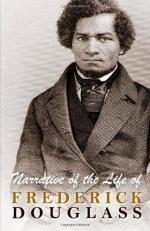The hearth is desolate. The children, the unconscious children, who once sang and danced in her presence, are gone. She gropes her way, in the darkness of age, for a drink of water. Instead of the voices of her children, she hears by day the moans of the dove, and by night the screams of the hideous owl. All is gloom. The grave is at the door. And now, when weighed down by the pains and aches of old age, when the head inclines to the feet, when the beginning and ending of human existence meet, and helpless infancy and painful old age combine together—at this time, this most needful time, the time for the exercise of that tenderness and affection which children only can exercise towards a declining parent—my poor old grandmother, the devoted mother of twelve children, is left all alone, in yonder little hut, before a few dim embers. She stands—she sits—she staggers—she falls—she groans—she dies—and there are none of her children or grandchildren present, to wipe from her wrinkled brow the cold sweat of death, or to place beneath the sod her fallen remains. Will not a righteous God visit for these things?
In about two years after the death of Mrs. Lucretia, Master Thomas married his second wife. Her name was Rowena Hamilton. She was the eldest daughter of Mr. William Hamilton. Master now lived in St. Michael’s. Not long after his marriage, a misunderstanding took place between himself and Master Hugh; and as a means of punishing his brother, he took me from him to live with himself at St. Michael’s. Here I underwent another most painful separation. It, however, was not so severe as the one I dreaded at the division of property; for, during this interval, a great change had taken place in Master Hugh and his once kind and affectionate wife. The influence of brandy upon him, and of slavery upon her, had effected a disastrous change in the characters of both; so that, as far as they were concerned, I thought I had little to lose by the change. But it was not to them that I was attached. It was to those little Baltimore boys that I felt the strongest attachment. I had received many good lessons from them, and was still receiving them, and the thought of leaving them was painful indeed. I was leaving, too, without the hope of ever being allowed to return. Master Thomas had said he would never let me return again. The barrier betwixt himself and brother he considered impassable.
I then had to regret that I did not at least make the attempt to carry out my resolution to run away; for the chances of success are tenfold greater from the city than from the country.
I sailed from Baltimore for St. Michael’s in the sloop Amanda, Captain Edward Dodson. On my passage, I paid particular attention to the direction which the steamboats took to go to Philadelphia. I found, instead of going down, on reaching North Point they went up the bay, in a north-easterly direction. I deemed this knowledge of the utmost importance. My determination to run away was again revived. I resolved to wait only so long as the offering of a favorable opportunity. When that came, I was determined to be off.




